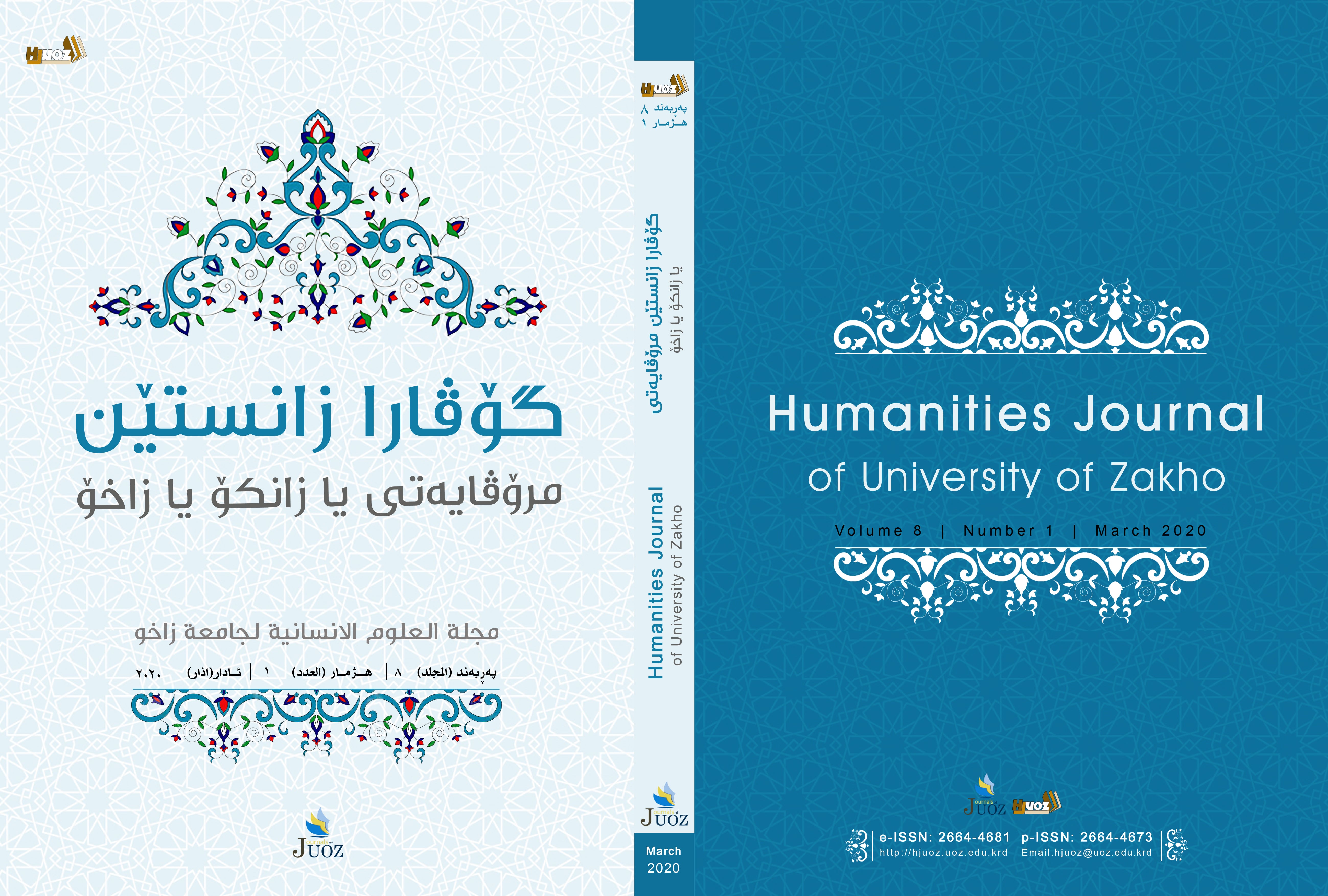The Embodiment of Mechanisms of the psychological Defense in the text of Kareem Balata’s Kotre
DOI:
https://doi.org/10.26436/hjuoz.2020.8.1.572Keywords:
kotre Poem, Defense Mechanisms, Freud, Psychoanalysis, Character (Personality), Social RelationshipAbstract
The Text of Kurdish poetry is a holder of a poet’s psychological state of the mind. A poet also starts to compose the poem based on his own feelings and emotions, the circumstances that the poet lives in, the events that were occurred, and poet’s ideas. Accordingly, we can say that a poet, as an individual in a society and the owner of his particular personality and feelings, faced to use several mechanisms in which are reflected directly or indirectly in the text during composing the poem in order to protect his personality, hence, it is to be regarded as a psychological defense - mechanism in psychoanalytic criticism (science). Those mechanisms that are used by informing and the help of the ideology of the poet in which they save his personality and leads his mind to be in tranquility and calmness. This study, entitled (The Embodiment of Mechanisms of the psychological Defense in the text of Kareem Balata’s Kotre), is prepared and it studies the text of the poem based on values of Psychoanalytic criticism. It is worth mentioning that the personality of the poet is embodied and really shown in the text where he is unable to hide his purposes behind his masks. A very accurate reading had been done to figure out that the poet is not only himself but actually leading his readers as well to be aware of his ideology and his psychological state of mind. Finally, it can be illustrated that the main character of the poem was able to adjust himself well with the around and at the same time is a character who is acceptable and has no psychological disorders.
Downloads
References
2. جى.اى.كادن، فرهنگ ادبیات و نقد، ترجمه: كاڤم فیروزمند، چاپ اول، چاپ غزال، نشر شادگان، تهران، 1380
3. رقیه اتشكار و دیگران، ارتباط سبك ها و مكانیزم هاى دفاعى با سیستم هاى مغزى/ رفتارى، مجله روانشناسى بالینى، سال چهارم، شماره 4 (پیاپى 16)، 1391.
4. شیرزاد گایفى و انیتا خالقى، نقد روانكاوانه سوگ نامههاى خاقانى شروانى، پژوهشنامه نقد ادبى وبلاغت، دانشگاه ارومیه، سال 3، شماره 2، پاییز و زمستان 1393.
5. د.على دهقان و سهیلا قاسمى، نقد روان شناختى اپار فروغ فرخ زاد بر اساس مبانى روان كاوى فروید و ادلر، فصلنامه علمى پژوهشى زبان و ادب فارسى، دانشگاه ادبیات و زبان هاى خارجى، دانشگاه ازاد اسلامى واحد سنندج، سال چهارم، شماره 12، پاییز 1391.
6. محمد رچا سلگانى، درامدى بر نقد نڤریه سلسله مراتب نیازهاى مازلو، فصلنامه مگالعات رفتار سازمانى، سال پنجم، شماره (1)، شماره پیاپى 17، 1395.
7. محمد صادق مۆمن زاده، برداشتهاى روان درمانى از مپنوى، چاپ اول، چاپخانه انتشارات سروش، تهران، 1378.
8. محمد صنعتى، تحلیل هاى روانشناختى در هنر و ادبیات، چاپ سوم، چاپ غزال، نشر مركز، تهران، 1384
9. مكانیسم هاى دفاعى و انواع ان، پایگاه خبرى روانشناسى و مشاوره، 1389. www.migna.ir
10. ویكى پدیا/ دانشنامه ازاد، هرم سلسله مراتب نیازهاى مازلو، wiki/fa.wikipedia.org//https:
Downloads
Published
How to Cite
Issue
Section
License
Authors who publish with this journal agree to the following terms:
- Authors retain copyright and grant the journal right of first publication with the work simultaneously licensed under a Creative Commons Attribution License [CC BY-NC-SA 4.0] that allows others to share the work with an acknowledgment of the work's authorship and initial publication in this journal.
- Authors are able to enter into separate, additional contractual arrangements for the non-exclusive distribution of the journal's published version of the work, with an acknowledgment of its initial publication in this journal.
- Authors are permitted and encouraged to post their work online.

















